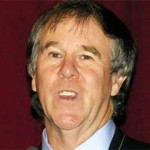 Tim Noakes has denied accusing anyone of match fixing or any claims that the Springboks’ quarterfinal match against Australia officiated by Bryce Lawrence was either ‘fixed’ or ‘bent’, as has been reported.
Tim Noakes has denied accusing anyone of match fixing or any claims that the Springboks’ quarterfinal match against Australia officiated by Bryce Lawrence was either ‘fixed’ or ‘bent’, as has been reported.
In a letter to Sport24, Noakes claimed that his statements had been misconstrued and taken out of context.
‘My motivation to write the letter (to the Cape Times) was most certainly not to accuse anyone of match fixing or to suggest that there was clear evidence that the game in question was either “fixed” or “bent”. For how could I ever possibly have any such evidence?’
‘It was merely to indicate that this particular game would prove a landmark case in the future history of the Rugby World Cup since it appeared as if refereeing decisions determined, in no small measure, the outcome of the game.’
Noakes said that he accepted that poor decisions were often made, but that this seldom influenced a result.
‘Of course this happens in many games but it must be seldom that a team that is so dominant on the field of play and as our captain said wins everything “but on the scoreboard”, ends up losing the match.’
Noakes said he had also been influenced by the statements of Andre Watson who earlier this week had an interview with 567 Cape Talk Radio in which he chastised Lawrence for his woeful performance.
‘Certain aspects of the game were “a mess” and a very fair report from Australia stating that even the Australians realised that the Springboks had been harshly treated.’
Tim Noakes said that as a senior exercise scientists in South Africa, the point of his letter was simple:
‘Science can offer a solution to this problem. Within a rugby match there is a normal allowable range of human error that referees would be expected to make.’
‘This can be quantified and is in fact something that happens in the review of the referee’s performances after all major games. This process has produced a gentleman’s agreement of what is an acceptable human error rate. Scientific analysis of these games would produce exact guidelines of what is an acceptable rate of referee error,’ Noakes opined.
Noakes said his point was simply that such an analysis needs to be done of the game in question to see if there were more refereeing errors in the game than is usual and if so, did they favor one or other team.
‘If it is found that there was an unexpected number of refereeing errors which favored the winning team, then a problem has been identified that requires correction. The nature of that problem then needs to be identified and the solution applied in future games of this magnitude.’
Noakes said in this way rugby would move forward and than fans would be spared similar events in the future.
Soos ‘n ware professor gestel. Wetenskap het ‘n oplossing vir elke probleem. Ek dink die tyd het nou aangebreek vir ‘n robot-ref. Genoeg van Human Error!
Die wereldkampioene is uit! Nadat hulle alles oorheers het! En dis juis hierdie redenasie wat my so frustreer van normaalweg regdenkende mense. As jy ‘n game so ‘oorheers’, behoort die ref GEEN invloed te he op die resultaat nie!
Verdomp mense! Dis maklik. Dis nie rocket science! Sien die lig!
Does not surprise me that the press has been guilty of “sensationalist reporting” without checking the facts with the so called perpetrator first. What worries me though is that the SA Rugby Mag took the stuff straight out of the Cape Times and report4ed it without referring to the Prof first. With what Tim Noakes has done for sport in our country you would think that at least a Rugby mag would not resort to hearsay and sensationalism. They are also on my sh!t list now along with all the newspapers I can think of with very few exceptions. What is interesting is that Afrikaans newspapers like Beeld and Rapport are more likely to report the proper facts than anyone else. I don’t know how they reported this….if at all?
Users Online
Total 103 users including 0 member, 103 guests, 0 bot online
Most users ever online were 3735, on 31 August 2022 @ 6:23 pm